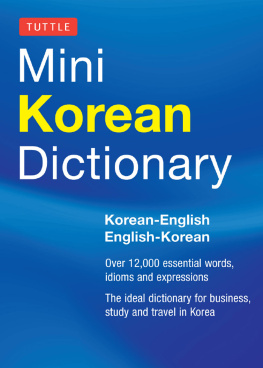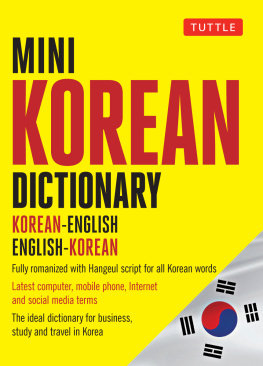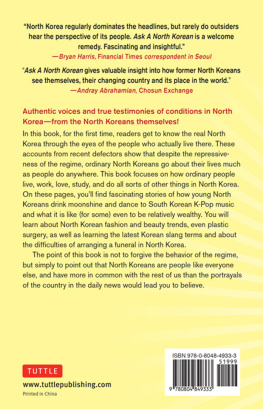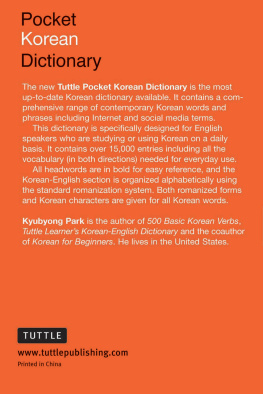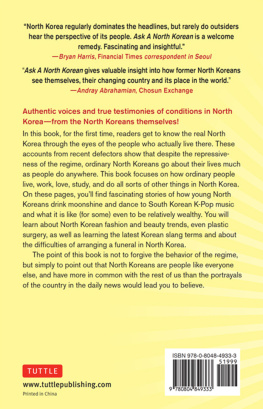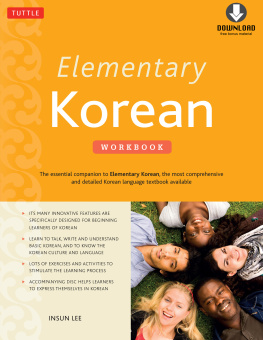Voices from the Korean War
Voices from the Korean War
PERSONAL STORIES of
AMERICAN, KOREAN, and
CHINESE SOLDIERS
Richard Peters and Xiaobing Li
THE UNIVERSITY PRESS OF KENTUCKY
Publication of this volume was made possible in part by a grant from the National Endowment for the Humanities.
Copyright 2004 by The University Press of Kentucky
Paperback edition 2005
Scholarly publisher for the Commonwealth, serving Bellarmine University, Berea College, Centre College of Kentucky, Eastern Kentucky University, The Filson Historical Society, Georgetown College, Kentucky Historical Society, Kentucky State University, Morehead State University, Murray State University, Northern Kentucky University, Transylvania University, University of Kentucky, University of Louisville, and Western Kentucky University.
All rights reserved.
Editorial and Sales Offices: The University Press of Kentucky
663 South Limestone Street, Lexington, Kentucky 40508-4008
www.kentuckypress.com
08 07 06 05 04 5 4 3 2 1
Library of Congress Cataloging-in-Publication Data
Peters, Richard A.
Voices from the Korean war : personal stories of American, Korean, and Chinese soldiers / Richard Peters and Xiaobing Li.
p. cm.
Includes bibliographical references and index.
ISBN 0-8131-2293-7 (Hardcover : alk. paper)
1. Korean War, 19501953Personal narratives. I. Li, Xiaobing, 1954 II. Title.
DS921.6.P37 2003
951.904'28dc21 2003014586
ISBN 0-8131-9120-3 (pbk : alk. paper)
This book is printed on acid-free recycled paper meeting the requirements of the American National Standard for Permanence of Paper for Printed Library Materials.
Manufactured in the United States of America
 | Member of the Association of American University Presses |
Contents
Maps
Photographs
Abbreviations
| CCP | Chinese Communist Party |
| CCYL | Chinese Communist Youth League |
| CIA | Central Intelligence Agency |
| CINCFE COM | Commander-in-Chief, Far East Command (U.S.) |
| CINC UNC | Commander-in-Chief, United Nations Command |
| CO | Commanding Officer (UN) |
| CP | Command Post |
| CPVF | Chinese Peoples Volunteers Force |
| CUF | Communist United Front (POW Camps, UN) |
| DPRK | Democratic Peoples Republic of Korea (North Korea) |
| FDC | Fire Direction Center (UN) |
| FECOM | Far East Command (U.S.) |
| FO | Forward Observer |
| HQ | Headquarters |
| JCS | Joint Chiefs of Staff |
| KDP | Korean Democratic Party (South Korean) |
| KMAG | Korean Military Advisory Group (U.S.) |
| KMT | Kuomintang (Taiwan) |
| KNP | Korean National Police (South Korea) |
| KWP | Korean Workers Party (North Korea) |
| MASH | Mobile Army Surgical Hospital |
| MLR | Main Line of Resistance |
| NCO | Non-Commissioned Officer |
| NKPA | North Korean Peoples Army |
| PG | Prisoner Guard (POW Camps, UN) |
| PLA | Peoples Liberation Army (China) |
| POW | Prisoner of War |
| PRC | Peoples Republic of China |
| R&R | Rest and Recuperation |
| RCT | Regimental Combat Team |
| ROC | Republic of China (Taiwan) |
| ROK | Republic of Korea (South Korea) |
| ROKA | Republic of Korea Army |
| UN | United Nations |
| UNC | United Nations Command |
| UNF | United Nations forces |
| UNTCOK | United Nations Temporary Commission of Korea |
| U.S. | United States |
| USAF | United States Air Force |
| USO | United Services Organization (U.S.) |
| WWII | World War II |
Note on Transliteration
The korean names of persons, places, and terms are translated by the co-authors, who follow the traditional East Asian practice that the surname is usually written first, as in Kim II Sung. Exceptions are made for a few figures whose names are widely known in reverse order, such as Syngman Rhee. If a place has different spellings in Korean and English literature, parentheses are used at its first appearancefor example, Hahwaokri (Hagaru-ri).
The pinyin romanization system is applied to Chinese names of persons, places, and terms. The transliteration is also used for the titles of Chinese publications. A persons name is written in the Chinese way, the surname first, such as Mao Zedong. Some popular names have traditional Wade-Giles spellings appearing in parentheses after the first use of the pinyin, such as Jiang Jieshi (Chiang Kai-shek), as do popular names of places like Beijing (Peking).
Preface
Explaining the methods employed to collect these soldiers stories poses something of a problem, in part because three different nationalities are involvedAmerican, Korean, and Chinese. Since the co-authors worked independently, we proceeded quite differently. Consequently, as co-authors we decided to describe the process in the same way, independently, and to break it down by nationality. We will begin with the recollections of the American veterans.
Stories by American Soldiers (Dr. Richard Peters)
Obtaining stories of American veterans of the Korean War was undoubtedly much simpler than collecting stories on the Chinese and Korean veterans, but it was not without some problems. One might assume that since I served in Korea during the war, I needed only to contact some of the men in my unit, the Fifth Regimental Combat Team. But like many veterans, I had not kept in touch with a single person. Nor did I belong to any of the established veterans organizations where one could expect to meet Korean War veterans.
Fortunately, an active chapter of the Korean War Veterans Association existed in Oklahoma City. I joined the chapter and began attending their monthly meetings. I was pleased to learn that the veterans in the chapter represented a large number of the units that had served in Korea during the war. After becoming acquainted with some of the members, I encouraged them to write (or tape) their stories about the war with the hope they would someday be published. I encouraged them to write about their noncombat experiences as well as their time in combat, because hard work, boredom, and even humor are also part of war. Eventually, some of the veterans began to write down their wartime experiences. These stories varied greatly in length and style. Sometimes I made extensive changes and sometimes only minor editing and grammatical changes. In all cases, I returned my copy of the story to the veteran, who then had the opportunity to make any corrections and perhaps add a bit of new material that he had failed to recall earlier. Eventually, often after lengthy telephone conversations, the story was finished.


